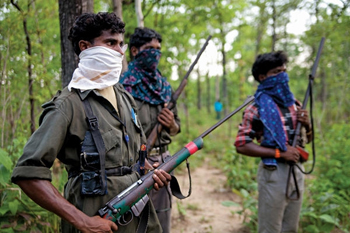Raipur, May 9: A hostage situation is continuing since last night in Sukma district of Chhattisgarh where around 250 villagers were seized by Maoist rebels on the eve of Prime Minister Narendra Modi's visit to neighbouring Dantewada.
 Chief Minister Raman Singh said anywhere between 200 and 250 villagers were abducted by the Naxals from a few villages in Sukma district and efforts were being made by the local administration for their release.
Chief Minister Raman Singh said anywhere between 200 and 250 villagers were abducted by the Naxals from a few villages in Sukma district and efforts were being made by the local administration for their release.
"Around 200-250 villagers have been abducted and 4-5 others (locals) are negotiating their release," Singh told journalists after conflicting claims were made by police officials on the number of villagers kidnapped by the ultras.
"There is no confusion....the local administration is making efforts for their release," he said.
Eearlier, Additional Superintendent of Police, Sukma, Harish Rathore said anywhere between 400 and 500 villagers were "taken away" to the jungles by the rebels opposing construction of a bridge, while Inspector General of Police, Bastar region, R P Kalluri, called it a "fiction" created by the media.
Unspecified number of Maoist guerrillas had swooped down on Marenga and some adjoining villages within the Tongpal police stations limits and herded the villagers to the nearby forest.
Meanwhile, Prime Minister Modi, who was on a visit to neighbouring Dantewada today, said there was no future for violence in democracy.
"Only plough on the shoulders and not guns can bring development. And this will bring everyone to the mainstream of the country. There is no future for violence. The future is only of peaceful means.
"The birth place of Naxal movement Naxalbari has already given up this violent means. Don't get disheartened," he said.
"The macabre drama of death will end," he said, referring to naxal violence in the state, and added "a lot of people have been killed by "mad men on the path of violence".
The Prime Minister inaugurated a slew of development projects in south Bastar region, worst-hit by the Naxal menance, during his day-long stay in Chhattisgarh.
Union Home Minister Rajnath Singh said in Lucknow that the Centre was making efforts for the release of hostages.
Security forces are combing the area to secure the release of the abductees.
"A large number of armed cadre stormed into Marenga and adjoining villages under restive Tongpal police station limits late last night and took away 400-500 villagers, including women and children, along with them," ASP Rathore told PTI.
Kalluri, on the other hand, said, "The hostage situation is a fiction created by the media....Yesterday, some Maoists came to the village where bridge construction is underway and they have taken five-six labourers who were working on the bridge.
"As is the usual practice, some villagers of Marenga and nearby villagers have gone to the jungle to speak to the Maoists, negotiate and bring these five-six labourers back...but reports of 500-600 villagers held by Maoists is total fiction," he said.
The Maoists have been opposing construction of a bridge on a river near Marenga village that they apprehended would facilitate increased mobility of security forces during operations against them.
The Maoists, who have called for a boycott of the Prime Minister's visit and a 'Dandakaranya Bandh' yesterday and today, went on rampage in several parts of Chhattisgarh's insurgency-hit Bastar region, damaging rail tracks on Kirandul-Visakhapatnam route and blocking roads.
Naxals removed fish-plates between Kakloor-Kumarsakhla villages in Kodenar police station limits in Bastar district late last night, Police said.
Soon after getting information, security personnel were dispatched to the spot and repair was underway.
In view of the bandh, the Railways had already decided not to run passenger and goods trains on Visakhapatanam-Kirandul route during this period, he said.
The bandh has hit normal life in the Bastar region with private transporters suspending their services.
The ultras also blocked roads in the interiors of Sukma and Bijapur districts by felling trees and digging roads, the official said, adding there were reports of villagers being prevented from attending Modi's programmes in Dantewada.





Comments
Add new comment